Former Bosnian Serb leader Radovan Karadzic enters the court room of the International Residual Mechanism for Criminal Tribunals in The Hague, Netherlands, Wednesday, March 20, 2019. Nearly a quarter of a century since Bosnia's devastating war ended, Karadzic is set to hear the final judgment on whether he can be held criminally responsible for unleashing a wave of murder and destruction. United Nations appeals judges will on Wednesday rule whether to uphold or overturn Karadzic's 2016 convictions for genocide, crimes against humanity and war crimes, as well as his 40-year sentence. (AP Photo/Peter Dejong, Pool)
The Associated Press
THE HAGUE, Netherlands (AP) - United Nations appeals judges on Wednesday upheld the convictions of former Bosnian Serb leader Radovan Karadzic for genocide, war crimes and crimes against humanity, and increased his sentence from 40 years to life imprisonment.
Karadzic showed almost no reaction as presiding judge Vagn Joensen of Denmark read out a damning judgment, which means the 73-year-old former Bosnian strongman will likely spend the rest of his life behind bars.
Karadzic had appealed his 2016 convictions for genocide, crimes against humanity and war crimes, as well as his sentence for masterminding atrocities in his country's devastating 1992-95 war - Europe's bloodiest conflict since World War II.
The former leader is one of the most senior figures tried by the Hague war crimes court. His case is considered as key in delivering justice for the victims of the conflict, which left over 100,000 people dead and millions homeless.
Joensen said the trial chamber was wrong to impose just a 40-year sentence given what he called the "sheer scale and systematic cruelty" of Karadzic's crimes.
Applause broke out in the public gallery as Joensen passed the new sentence.
Families of victims who traveled to the Hague welcomed the verdict. Mothers of victims, some elderly and walking with canes, wept with apparent relief after watching the ruling read on a screen in Srebrenica.
Bosnian Serb wartime military commander Ratko Mladic was also awaiting an appeal judgment of his genocide and war crimes conviction, which earned him a life sentence.
Both men were convicted of genocide for their roles in the slaughter by Serb forces of 8,000 Muslim men and boys in the Bosnia's eastern Srebrenica region in July 1995.
Prosecutors had appealed Karadzic's acquittal on a second count of genocide, which saw Serb forces drive out Muslims and Croats from Serb-controlled villages in a 1992 campaign. Judges on Wednesday rejected that appeal.
At an appeals hearing last year, prosecution lawyer Katrina Gustafson told a five-judge panel that Karadzic "abused his immense power to spill the blood of countless victims. Justice requires that he receive the highest possible sentence - a life sentence."
Karadzic has always argued that the Bosnian Serb campaigns during the war, which included the bloody siege of the capital, Sarajevo, were aimed at defending Serbs.
After his indictment by the tribunal in The Hague, Karadzic remained at large for years before he was arrested in Serbia in 2008 disguised as a new-age therapist.
Former Bosnian Serb leader Radovan Karadzic enters the court room of the International Residual Mechanism for Criminal Tribunals in The Hague, Netherlands, Wednesday, March 20, 2019. Nearly a quarter of a century since Bosnia's devastating war ended, Karadzic is set to hear the final judgment on whether he can be held criminally responsible for unleashing a wave of murder and destruction. United Nations appeals judges will on Wednesday rule whether to uphold or overturn Karadzic's 2016 convictions for genocide, crimes against humanity and war crimes, as well as his 40-year sentence. (AP Photo/Peter Dejong, Pool)
The Associated Press
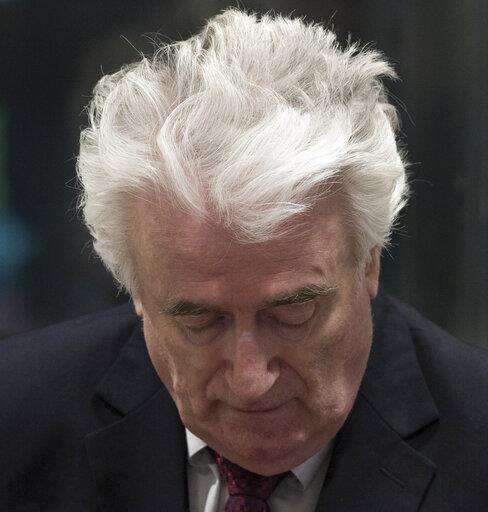
Former Bosnian Serb leader Radovan Karadzic enters the court room of the International Residual Mechanism for Criminal Tribunals in The Hague, Netherlands, Wednesday, March 20, 2019. Nearly a quarter of a century since Bosnia's devastating war ended, Karadzic is set to hear the final judgment on whether he can be held criminally responsible for unleashing a wave of murder and destruction. United Nations appeals judges will on Wednesday rule whether to uphold or overturn Karadzic's 2016 convictions for genocide, crimes against humanity and war crimes, as well as his 40-year sentence. (AP Photo/Peter Dejong, Pool)
The Associated Press

FILE - In this Thursday July 31, 2008 file photo, former Bosnian Serb leader Radovan Karadzic stands in the courtroom during his initial appearance at the U.N.'s Yugoslav war crimes tribunal in The Hague, Netherlands. Nearly a quarter of a century since Bosniaâs devastating war ended, former Bosnian Serb leader Radovan Karadzic is set to hear the final judgment on whether he can be held criminally responsible for unleashing a wave of murder and destruction during Europeâs bloodiest carnage since World War II. United Nations appeals judges on Wednesday March 20, 2019, will decide whether to uphold or overturn Karadzicâs 2016 convictions for genocide, crimes against humanity and war crimes and his 40-year sentence. (Jerry Lampen/Pool via AP, File)
The Associated Press
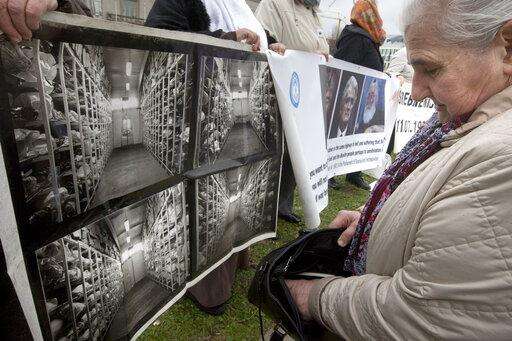
Munira Subasic of the Mothers of Srebrenica, right, and other protestors hold pictures of exhumed bodies from mass graves and pictures of former Bosnian Serb leader Radovan Karadzic outside the building which houses the International Residual Mechanism for Criminal Tribunals in The Hague, Netherlands, Wednesday, March 20, 2019. Nearly a quarter of a century since Bosnia's devastating war ended, Karadzic is set to hear the final judgment on whether he can be held criminally responsible for unleashing a wave of murder and destruction. United Nations appeals judges will on Wednesday rule whether to uphold or overturn Karadzic's 2016 convictions for genocide, crimes against humanity and war crimes, as well as his 40-year sentence. (AP Photo/Peter Dejong)
The Associated Press
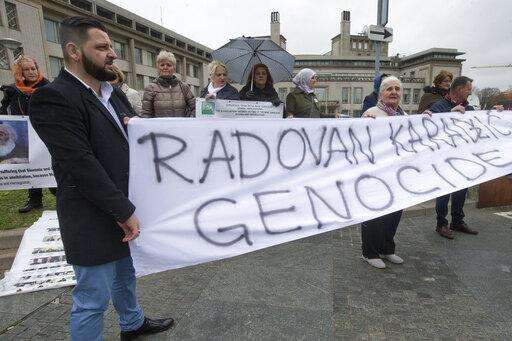
Munira Subasic of the Mothers of Srebrenica, center right with white hair, and other protestors hold a banner outside the building which houses the International Residual Mechanism for Criminal Tribunals in The Hague, Netherlands, Wednesday, March 20, 2019. Nearly a quarter of a century since Bosnia's devastating war ended, former Bosnian Serb leader Radovan Karadzic is set to hear the final judgment on whether he can be held criminally responsible for unleashing a wave of murder and destruction. United Nations appeals judges will on Wednesday rule whether to uphold or overturn Karadzic's 2016 convictions for genocide, crimes against humanity and war crimes, as well as his 40-year sentence. (AP Photo/Peter Dejong)
The Associated Press
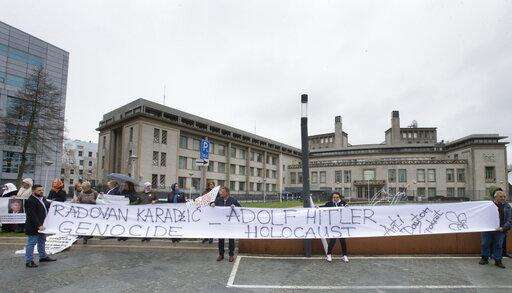
Women with the Mothers of Srebrenica, and other protestors hold a banner outside the building which houses the International Residual Mechanism for Criminal Tribunals in The Hague, Netherlands, Wednesday, March 20, 2019. Nearly a quarter of a century since Bosnia's devastating war ended, former Bosnian Serb leader Radovan Karadzic is set to hear the final judgment on whether he can be held criminally responsible for unleashing a wave of murder and destruction. United Nations appeals judges will on Wednesday rule whether to uphold or overturn Karadzic's 2016 convictions for genocide, crimes against humanity and war crimes, as well as his 40-year sentence. (AP Photo/Peter Dejong)
The Associated Press
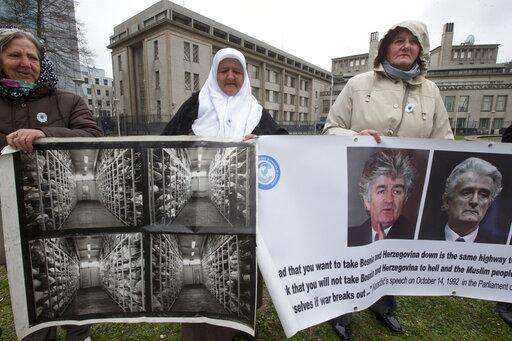
Mothers of Srebrenica hold pictures of exhumed bodies from mass graves and pictures of former Bosnian Serb leader Radovan Karadzic outside the building which houses the International Residual Mechanism for Criminal Tribunals in The Hague, Netherlands, Wednesday, March 20, 2019. Nearly a quarter of a century since Bosnia's devastating war ended, Karadzic is set to hear the final judgment on whether he can be held criminally responsible for unleashing a wave of murder and destruction. United Nations appeals judges will on Wednesday rule whether to uphold or overturn Karadzic's 2016 convictions for genocide, crimes against humanity and war crimes, as well as his 40-year sentence. (AP Photo/Peter Dejong)
The Associated Press
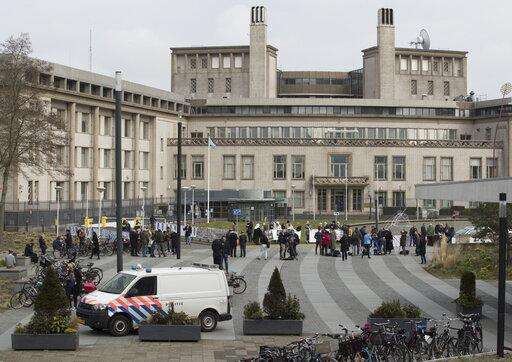
Demonstrators and journalists gather outside the building which houses the International Residual Mechanism for Criminal Tribunals prior to the appeals judgment of former Bosnian Serb leader Radovan Karadzic in The Hague, Netherlands, Wednesday, March 20, 2019. Nearly a quarter of a century since Bosnia's devastating war ended, Karadzic is set to hear the final judgment on whether he can be held criminally responsible for unleashing a wave of murder and destruction. United Nations appeals judges will on Wednesday rule whether to uphold or overturn Karadzic's 2016 convictions for genocide, crimes against humanity and war crimes, as well as his 40-year sentence. (AP Photo/Peter Dejong)
The Associated Press

FILE - In this Sept. 23, 1992 file photo, Bosnian Serb leader Radovan Karadzic holds a knife he said was seized from Bosnian Croat soldiers in Bosnia during a news conference in Belgrade, Yugoslavia. Nearly a quarter of a century since Bosniaâs devastating war ended, former Bosnian Serb leader Radovan Karadzic is set to hear the final judgment on whether he can be held criminally responsible for unleashing a wave of murder and destruction during Europeâs bloodiest carnage since World War II. United Nations appeals judges on Wednesday March 20, 2019, will decide whether to uphold or overturn Karadzicâs 2016 convictions for genocide, crimes against humanity and war crimes and his 40-year sentence. (AP Photo/File)
The Associated Press

FILE - In this Aug. 25, 1992 file photo, Radovan Karadzic, Bosnian Serb leader in Bosnia-Herzegovina, indicates the Serb territories in Yugoslavia during a news conference in London. Nearly a quarter of a century since Bosniaâs devastating war ended, former Bosnian Serb leader Radovan Karadzic is set to hear the final judgment on whether he can be held criminally responsible for unleashing a wave of murder and destruction during Europeâs bloodiest carnage since World War II. United Nations appeals judges on Wednesday March 20, 2019, will decide whether to uphold or overturn Karadzicâs 2016 convictions for genocide, crimes against humanity and war crimes and his 40-year sentence. (AP Photo/Denis Paquin, File)
The Associated Press

FILE - A July 13, 1995 file photo shows refugees from the overrun U.N. safe haven enclave of Srebrenica looking through the razor-wire at newly arriving refugees, in a UN base 12 kms south of Tuzla, 100kms (60 miles) north of Sarajevo. Nearly a quarter of a century since Bosniaâs devastating war ended, former Bosnian Serb leader Radovan Karadzic is set to hear the final judgment on whether he can be held criminally responsible for unleashing a wave of murder and destruction during Europeâs bloodiest carnage since World War II. United Nations appeals judges on Wednesday March 20, 2019, will decide whether to uphold or overturn Karadzicâs 2016 convictions for genocide, crimes against humanity and war crimes and his 40-year sentence. (AP Photo/Darko Bandic, File)
The Associated Press
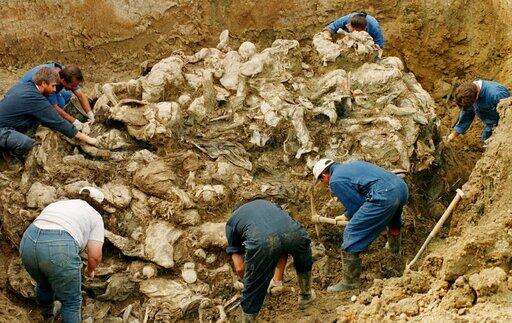
FILE - In this Sept. 18, 1996 file photo, International War Crimes Tribunal investigators clear away soil and debris from dozens of Srebrenica victims buried in a mass grave near the village of Pilica, north east of Tuzla, Boisnia-Herzegovina. Nearly a quarter of a century since Bosniaâs devastating war ended, former Bosnian Serb leader Radovan Karadzic is set to hear the final judgment on whether he can be held criminally responsible for unleashing a wave of murder and destruction during Europeâs bloodiest carnage since World War II. United Nations appeals judges on Wednesday March 20, 2019, will decide whether to uphold or overturn Karadzicâs 2016 convictions for genocide, crimes against humanity and war crimes and his 40-year sentence. (AP Photo/Staton R. Winter, File)
The Associated Press
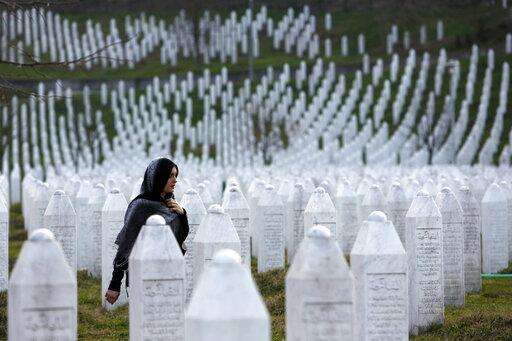
FILE - In this Sunday, March 20, 2016 file photo, a Bosnian woman walks among gravestones at Memorial Centre Potocari near Srebrenica, Bosnia and Herzegovina. Nearly a quarter of a century since Bosniaâs devastating war ended, former Bosnian Serb leader Radovan Karadzic is set to hear the final judgment on whether he can be held criminally responsible for unleashing a wave of murder and destruction during Europeâs bloodiest carnage since World War II. United Nations appeals judges on Wednesday March 20, 2019, will decide whether to uphold or overturn Karadzicâs 2016 convictions for genocide, crimes against humanity and war crimes and his 40-year sentence. (AP Photo/Amel Emric, File)
The Associated Press
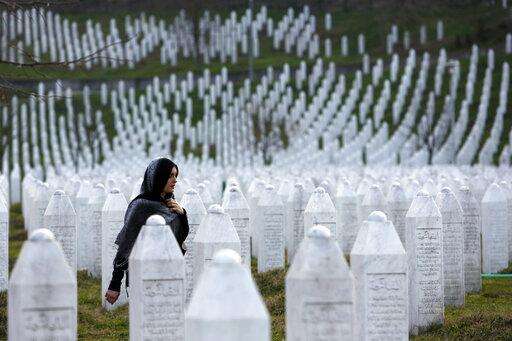
FILE - In this Sunday, March 20, 2016 file photo, a Bosnian woman walks among gravestones at Memorial Centre Potocari near Srebrenica, Bosnia and Herzegovina. Nearly a quarter of a century since Bosniaâs devastating war ended, former Bosnian Serb leader Radovan Karadzic is set to hear the final judgment on whether he can be held criminally responsible for unleashing a wave of murder and destruction during Europeâs bloodiest carnage since World War II. United Nations appeals judges on Wednesday March 20, 2019, will decide whether to uphold or overturn Karadzicâs 2016 convictions for genocide, crimes against humanity and war crimes and his 40-year sentence. (AP Photo/Amel Emric, File)
The Associated Press

Former Bosnian Serb leader Radovan Karadzic enters the court room of the International Residual Mechanism for Criminal Tribunals in The Hague, Netherlands, Wednesday, March 20, 2019. Nearly a quarter of a century since Bosnia's devastating war ended, Karadzic is set to hear the final judgment on whether he can be held criminally responsible for unleashing a wave of murder and destruction. United Nations appeals judges will on Wednesday rule whether to uphold or overturn Karadzic's 2016 convictions for genocide, crimes against humanity and war crimes, as well as his 40-year sentence. (AP Photo/Peter Dejong, Pool)
The Associated Press
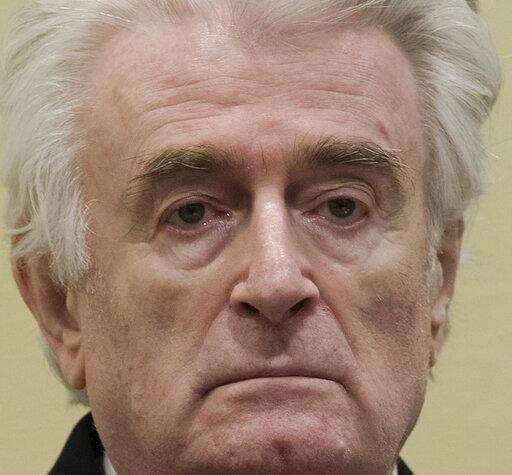
Former Bosnian Serb leader Radovan Karadzic enters the court room of the International Residual Mechanism for Criminal Tribunals in The Hague, Netherlands, Wednesday, March 20, 2019. Nearly a quarter of a century since Bosnia's devastating war ended, Karadzic is set to hear the final judgment on whether he can be held criminally responsible for unleashing a wave of murder and destruction. United Nations appeals judges will on Wednesday rule whether to uphold or overturn Karadzic's 2016 convictions for genocide, crimes against humanity and war crimes, as well as his 40-year sentence. (AP Photo/Peter Dejong, Pool)
The Associated Press

Former Bosnian Serb leader Radovan Karadzic, center, waits for judges to enter the court room of the International Residual Mechanism for Criminal Tribunals in The Hague, Netherlands, Wednesday, March 20, 2019. Nearly a quarter of a century since Bosnia's devastating war ended, Karadzic is set to hear the final judgment on whether he can be held criminally responsible for unleashing a wave of murder and destruction. United Nations appeals judges will on Wednesday rule whether to uphold or overturn Karadzic's 2016 convictions for genocide, crimes against humanity and war crimes, as well as his 40-year sentence. (AP Photo/Peter Dejong, Pool)
The Associated Press